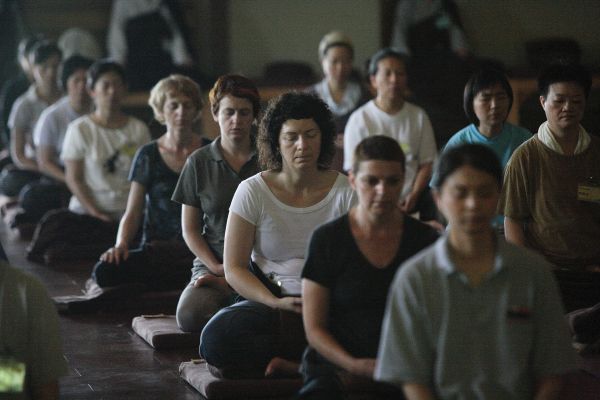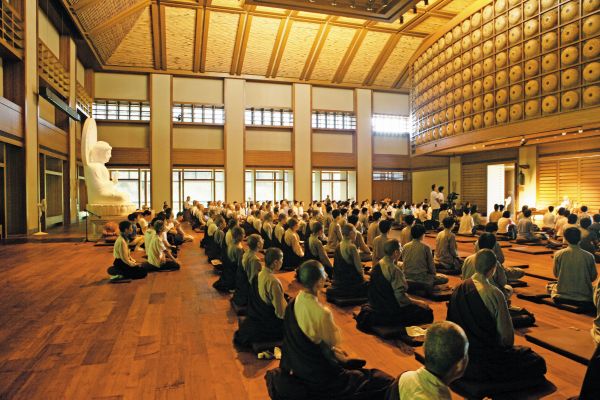Chan Meditation Roadmap
Meditation Has Become a Worldwide Trend

Although nowadays, many people enjoy a materially abundant life, it often comes at the expense of increased pressure from work, relationships, society, and family, leaving most people overwhelmed. Some degree of stress could, in some circumstances, be a driving force for progress. Nevertheless, both physical and mental health can be seriously affected when one is exposed to great pressure for a long stretch of time. To release pressure, massage, aromatic therapy, soothing bubbles, the recent trend in so-called "Slow Travel", etc. have become commonplace methods of stress reduction; some hospitals even provide "relaxation clinics" to teach people how to adjust their moods and to relax both physically and mentally, so that they can get recharged to face daily challenges again.
According to Time Magazine, every day, more than ten million people in the US try to relax and reduce their stress by way of practicing meditation. Other means include exercise, listening to music, working out in the gym, painting, yoga, Qigong, etc. In the midst of all these, Chan meditation has become "mainstream," being studied and practiced all over the world. In fields as diverse as medicine, sports, education, literature, and arts, people from East and West alike are approaching the ancient Chan practice through different perspectives. In business, employees are encouraged to apply Chan practice in their job and to train their body and mind. It is as though the body and mind could easily get anchored simply by holding onto the idea of "Chan" in work and daily life.
Bodily Awareness Through Relaxation
Modern people are too good at neglecting the signals their body sends to them. It's just like filling up a balloon: only until it bursts do we finally realize that the body is truly too tense and too exhausted. Becoming aware of bodily sensations is the first step to relaxation. More often than not, people are quite unaware of our bodily signals, such as clenching jaws, raising shoulders unknowingly, squinting eyes, gas in the stomach, migraine, or fists clamping during sleep, etc. All these signals are telling us that we are under "tension" or "stress."

In fact, relaxation is our instinct. No one likes the feeling of discomfort. Relaxation is just letting go of the feeling of discomfort. We let go of the feeling of discomfort wherever we find it, and gradually we'll be in the state of being relaxed. Through the practice of Chan, we can observe step by step the tension within us, and then loosen up all that tension layer by layer.
The key to relaxation lies in the mind itself. Relaxation of the mind leads to letting go; letting go of the body brings relaxation. In relaxation, the body is guided by the mind. Body and mind are one. Our physical reaction reveals our state of mind, and our stress comes from the mind's reaction to the external environment as well as our self-assessment.
The process of fine-tuning the body and mind itself is actually a journey of self-exploration within. From the release of pressure to the enhancement of self-awareness, one is able to understand and accept one's characteristics. While exploring the meaning of life, one penetrates the superficial phenomenon, learning to appreciate, enjoy and be grateful for the bountiful richness of life – this is none other than the life of wisdom through Chan.
When doing anything, use your mind, not your force.

The late Master Sheng Yen often described someone with a relaxed body and mind as "the one without burden." But here, such a person "without burden" is definitely not someone careless, or indifferent to everything around them; such a person will remain present at each and every moment and deal with everything at hand earnestly. Once things have been taken care of, he or she just lets it go, without anything lingering behind in his or her mind. How could one relax one's mind then? Just as the late Master Sheng Yen once said, "Do not yearn for good fortune; do not reject bad fortune. Each and every phenomenon arises with its proper causes and conditions. As much as one can, with a peaceful mind, accept it, deal with it, and accomplish it, then one can easily get relaxed."
Relaxing through Chan brings stability and calmness to the body and mind at any moment in time. The practice of Chan, however, is not just about generating the proper means of relaxation; it's more about the wisdom of life. What modern people need is not just physical care, Qigong, or psychotherapy, but, more so, comprehensive wisdom for one's inner world and the philosophy for dealing with the external world, with which one can safely settle his or her life. In order for someone to truly relax, both physically and mentally, he or she must be someone who has thoroughly understood the value of life. When doing anything, he or she uses their mind, rather than by force, just as in Chan Master Dahui Zonggao's famous saying, "Where it becomes effortless is where one gains strength." When we become relaxed in an effortless way, we salvage unlimited strength. Then, in turn, we would be strengthened infinitely with the unlimited strength saved, effortless in dealing with things at hand, and with a mind of even more freedom.
Relaxing through Chan brings stability and calmness to the body and mind at any moment in time. The practice of Chan, however, is not just about generating the proper means of relaxation; it's more about the wisdom of life. What modern people need is not just physical care, Qigong, or psychotherapy, but, more so, comprehensive wisdom for one's inner world and the philosophy for dealing with the external world, with which one can safely settle his or her life. In order for someone to truly relax, both physically and mentally, he or she must be someone who has thoroughly understood the value of life. When doing anything, he or she uses their mind, rather than by force, just as in Chan Master Dahui Zonggao's famous saying, "Where it becomes effortless is where one gains strength." When we become relaxed in an effortless way, we salvage unlimited strength. Then, in turn, we would be strengthened infinitely with the unlimited strength saved, effortless in dealing with things at hand, and with a mind of even more freedom.
